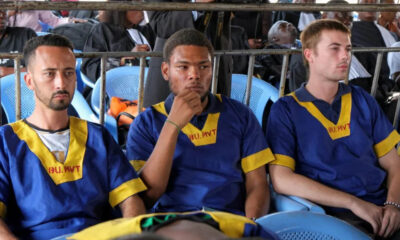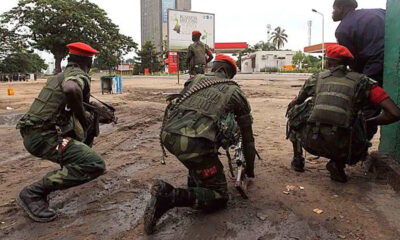International
Panic over coup attempt in Bolivia, police arrest leader
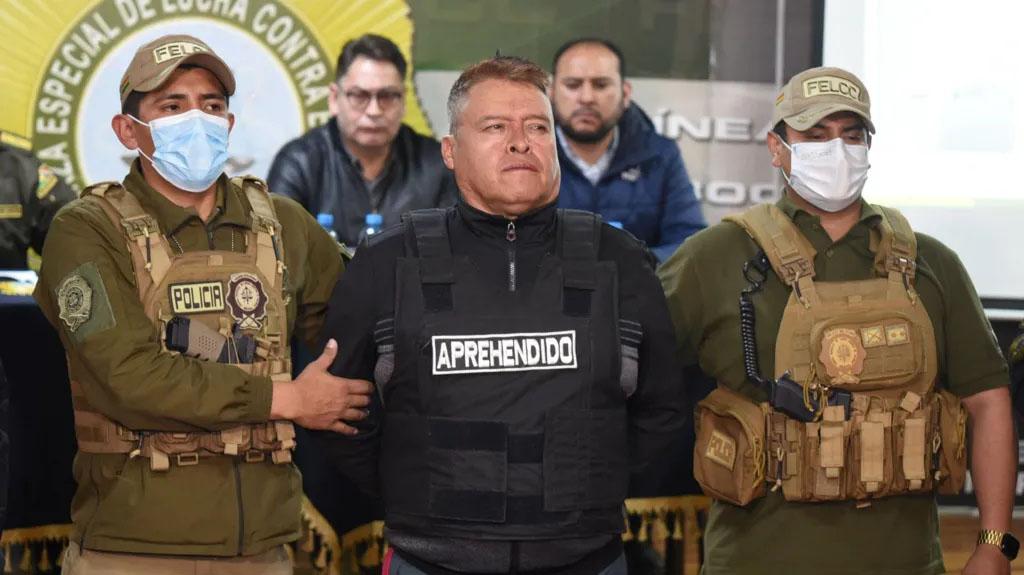
Panic over coup attempt in Bolivia, police arrest leader
Bolivian police have arrested the leader of an attempted coup, hours after the presidential palace in the capital La Paz was stormed by soldiers.
Armoured vehicles and troops had taken up position on Murillo Square where key government buildings are located. They all later withdrew.
The rebel military leader in charge, Gen Juan José Zúñiga, had said he wanted to “restructure democracy” and that while he respected President Luis Arce for now, there would be a change of government. He is now under arrest.
President Arce condemned the coup attempt, calling on the public to “organise and mobilise… in favour of democracy”.
“We cannot allow once again coup attempts to take Bolivian lives,” he said in a televised message to the country from inside the presidential palace.
His words clearly resonated, with pro-democracy demonstrators taking to the streets in support of the government.
Mr Arce also announced he was appointing new military commanders, confirming reports that Gen Zúñiga had been dismissed after openly criticising Bolivia’s former leader, Evo Morales.
Mr Morales also condemned the coup attempt and called for criminal charges to be brought against Gen Zúñiga and his “accomplices”.
The public prosecutor’s office has opened a criminal investigation.
It is increasingly clear that this was a short-lived and ill-judged military uprising rather than any wider unravelling of power.
READ ALSO:
- Many Ondo APC members dump party for PDP
- Gunmen attack Ebonyi police station, five killed
- Osun monarch, four other arraigned over burnt palace, robbery
Nevertheless, the coming weeks will be key in establishing whether Gen Zuñiga’s military insurrection was just an isolated incident.
Certainly, the government now looks more vulnerable, and others may try to dislodge Mr Arce’s administration – albeit through politics rather than via the military.
Furthermore, he could count on the support of Evo Morales, the influential former president and the elder statesman of Bolivia’s left.
Mr Morales called on his supporters, particularly in the country’s indigenous coca-growers movement, to take to the streets to demand an end to the attempt coup.
That display of popular power may well have helped strengthen the resolve against Gen Zuñiga’s plans, which also included freeing “political prisoners” including former leader Jeanine Áñez.
Speaking from Murillo Square after it was taken by troops, Gen Zúñiga had said: “We are going to recover this homeland.
“An elite has taken over the country, vandals who have destroyed the country.”
He was sacked after appearing on television on Monday, saying he would arrest Mr Morales if he ran for office again next year, despite the former president being barred from doing so.
Formerly allies, Mr Arce and Mr Morales have not seen eye to eye on much recently, but they were united in their condemnation of the use of troops to force political change in Bolivia.
Indeed, in 2019, President Morales himself was forced out by military chiefs who said he was trying to manipulate the result of a presidential election, sending him into exile in Mexico.
Before Evo Morales took power in 2005, Bolivia was one of the most politically volatile nations in the Americas. His time in power brought much-needed stability to the Andean nation, at least until its ignominious end.
For his part, Mr Arce – who was elected after a period of instability following the 2019 election – will have been heartened by the speed of the regional response.
Close allies like the left-wing governments in Venezuela and Colombia were quick to condemn what was happening and call for democracy to prevail. Washington also called for calm.
Even those Bolivians who opposed his socialist rule will not want to see a return to a dark time in South America where militaries with terrible human rights records often pushed out the country’s democratically elected leaders at the barrel of a gun.
Panic over coup attempt in Bolivia, police arrest leader
BBC
International
Thousands pay tributes as Pope Francis’ body lies in state at St. Peter’s Basilica

Thousands pay tributes as Pope Francis’ body lies in state at St. Peter’s Basilica
Vatican City was filled with the sounds of bells and heartfelt chants on Wednesday morning, as thousands of mourners gathered to honor the late Pope Francis.
In a moving and solemn procession, his simple wooden coffin was carried through St. Peter’s Square, marking the beginning of final rites for the beloved pontiff.
The procession began at the Domus Sancta Marta, the residence where Pope Francis passed away, and continued toward St. Peter’s Basilica. There, his body will lie in state until his funeral, scheduled for Saturday.
Two long lines of cardinals and Vatican officials escorted the coffin, while faithful from around the world looked on in prayer and reverence.
Dressed in a red chasuble and a white miter, with a rosary gently wrapped around his fingers, Pope Francis was honored with continuous applause as Swiss Guards solemnly accompanied the casket through the square.
Teresa Piuvano, a New Jersey resident who has been in Rome since March volunteering at Vatican events for the Jubilee year, saw Francis’ appearances on Palm Sunday and Easter Sunday. Easter, she said, “was the most special. I think he wanted to do that to say goodbye to the people because he rode around the whole square even though he was very ill.”
Inside the basilica, the pope was laid on a simple podium instead of the wooden structure, called a catafalque that has traditionally held a pope’s coffin as he lies in state. The ceremony that concluded the procession, led by Cardinal Kevin Farrell, who as camerlengo is charged with overseeing the logistics of the pope’s funeral, referred to Francis in humble terms such as “bishop” and “pastor.”
READ ALSO:
- Rivers: Tinubu set to emergency rule after meeting Fubara
- NNPCL: Protesters storm AGF office, demand probe of Mele Kyari
- Fresh herders’ attack claims 11 lives in Benue
“Dearest brothers and sisters, with great emotion we accompany the mortal remains of our Pope Francis into the Vatican basilica where he often exercised his ministry as the bishop of the church that is in Rome and as pastor of the universal church,” Farrell said in the prayer service.
After the death of Pope Emeritus Benedict XVI, Francis changed the protocol for papal funerals to streamline and simplify the procedures. The pope wanted his own funeral to reflect the life of a pastor and not of a powerful king or politician, he said in interviews.
After the ceremony, cardinals proceeded to bow one by one in front of the coffin before the mourners lined up in the square were admitted.
Nearly 20,000 people visited the basilica yesterday, according to the Vatican, which added that it would ensure that all who wish to pay their final respects to the pope have a chance by staying open after midnight if necessary.
Second General Congregation of Cardinals held in the Vatican
The second General Congregation of Cardinals began yesterday afternoon in the Synod Hall at about 5:00 PM, and ended at 6:30 PM.
According to the Holy See Press Office, 103 cardinals were present. They began the meeting with the ‘Veni, Sancte Spiritus’ prayer, and then with a prayer in suffrage of Pope Francis.
The Cardinals who were not present at Tuesday’s General Congregation were sworn in.
The programme of the Novemdiales, the ancient nine-day period of mourning for the Pope, was approved.
The next General Congregation will be today at 9:00 AM.
At the first General Congregation, held on Tuesday morning, the Cardinals decided to suspend all scheduled beatifications until the new Pope can approve them.
Moreover, in accordance with the norms of Universi Dominici Gregis, a commission of three Cardinals was selected by lot to assist the Camerlengo in the governance of the Church during the sede vacante.
These three Cardinals represent the three orders of the College of Cardinals and are replaced every three days. The first group of three Cardinals chosen was Pietro Parolin (episcopal order), Stanisław Ryłko (presbyteral order), and Fabio Baggio (diaconal order).
The Holy See Press Office noted that around 20,000 people had paid their respects to the late Pope Francis as of 7:30 PM on Wednesday evening.
Why King Charles isn’t allowed at pope’s funeral
Prince William will be traveling to the Vatican to attend the funeral of Pope Francis on behalf of the British royal family later this week. And if you’re wondering why King Charles isn’t going, he literally isn’t allowed.
Royal expert Katie Nicholl writes in Vanity Fair that King Charles “will not travel to the Vatican, in accordance with protocol and precedence which dictates that the Sovereign does not attend funerals, Buckingham Palace has confirmed.” And FYI, this isn’t the first time an heir has attended the funeral of a pope on behalf of the sovereign—back in 2005, then-Prince Charles attended Pope John Paul II’s funeral instead of Queen Elizabeth.
That said, King Charles did visit the pope just a few days before his recent passing, and he released a statement after his death.
Thousands pay tributes as Pope Francis’ body lies in state at St. Peter’s Basilica
International
UK records over 22,000 asylum-seeking Nigerians

UK records over 22,000 asylum-seeking Nigerians
The United Kingdom Home Office received 22,619 asylum petitions from Nigerian nationals between 2010 and 2024.
Nigerians accounted for one in every 30 UK asylum claims over the time, ranking 11th in the Home Office’s recently released year-end asylum and resettlement figures.
According to the Home Office, over two times as many Nigerians (2,841) requested asylum in 2024 than in 2023 (1,462).
Overall, 108,138 people applied for asylum in the UK in 2024, representing a 378 per cent increase from 2010. The majority were first-time claims by South Asian and Middle Eastern nationals.
Iran topped the chart with 75,737, perhaps pushed by the rising persecution of dissidents by the Iranian regime.
Pakistan trailed far behind with 57,621. In 2024, 10,542 Pakistanis sought asylum in the UK, prompted by post-election upheaval, rising inflation, and an increase in blasphemy cases, which human rights groups argue provide strong grounds for protection claims.
Afghanistan has received 54,363 asylum petitions since 2010. In 2024, 8,508 Afghans sought sanctuary in the United Kingdom, a development that experts suggest is a continuation of the Taliban’s ouster of the Karzai administration in 2022.
That year, 11,358 Afghans applied for asylum in the United Kingdom, with 9,710 applications the following year.
Others include Albania (50,944), Iraq (45,711), Eritrea (37,687), Syria (34,997), and Bangladesh (31,744). Asylum seekers from Bangladesh increased from 5,097 in 2023 to 7,225 in 2024. The rise corresponded with the removal of previous Prime Minister Sheikh Hasina.
READ ALSO:
- Driver crushes one-year old boy to death in Ekiti
- Bring your children to compete with mine, MC Oluomo challenges those mocking his spoken English
- Insecurity: Presidency questions push for state police, accuses govs of not doing much
Sudan and India complete the top ten, with 30,897 and 30,179, respectively.
Nigeria’s 22,619 filings are just ahead of Sri Lanka’s 22,059 and surpass Vietnam, China, and Turkey. Brazil, Kuwait, Yemen, Colombia, and Jordan were at the bottom of the list, with each providing fewer than 6,500 claims.
Analysts attribute Nigeria’s rise on the list to tough conditions such as insecurity, bandit assaults, abduction, and a collapse in household purchasing power following the naira’s devaluation in 2023.
In a conversation with our correspondent, Charles Onunaiju, Research Director, Centre for China Studies, Abuja, stated, “We face a difficulty. Nigeria is becoming unfriendly, particularly for young people with limited opportunities, and there is a desperate desire to travel overseas.
According to local reports, young professionals who previously entered the UK on skilled worker visas are increasingly hedging their bets by applying for asylum once there; others arrive irregularly via continental Europe, citing kidnapping threats and communal attacks in their affidavits.
According to the reports, in most cases, petitioners also claim political persecution under Nigeria’s wide cybercrime legislation or discrimination based on sexual orientation—both of which are protected under the Refugee Convention.
According to the Home Office’s website, an asylum seeker must demonstrate a “well-founded fear of persecution” because of their race, religion, nationality, political opinion, or membership in a certain social group.
The Home Office determines the initial decisions, and negative rulings can be challenged in the Immigration and Asylum Chamber.
In theory, the Illegal Migration Act of 2023 makes people who travel through a safe third nation inadmissible.
However, the UK government’s proposed removal process, particularly its contract with former Prime Minister Rishi Sunak to transfer claimants to Rwanda, is still enmeshed in legal obstacles.
As a result, the majority of 2024 and 2025 arrivals will continue to use the existing system.
Dr Aliyu Ilias, an Abuja-based development economist, told The PUNCH that as more Nigerians leave and stay permanently overseas, the country will have less trained labour.
He stated that with most Nigerians confronting both economic headwinds and deteriorating security at home, the British asylum route, however uncertain, still appears to offer a better prospect.
Ilias explained, “It’s definitely a cause of concern because this includes our professionals who are moving, and it takes a whole lot to train these professionals.
“In the medical sector, Nigeria subsidises a lot to get people trained. You cannot get trained as a medical doctor or an engineer abroad for a cheaper cost compared to what we get in Nigeria.
“So, it is total brain drain in the long run, and for the economy, it is reducing our GDP. The appalling part is that most of our Nigerian brothers and sisters who go out do not return. They get permanent residency, and they become valuable to the immediate country.”
UK records over 22,000 asylum-seeking Nigerians
International
Harvard University sues Trump over funding cuts

Harvard University sues Trump over funding cuts
Harvard sued US President Donald Trump’s administration Monday in a sharp escalation of the fight between the prestigious university and the Republican, who has threatened its funding and sought to impose outside political supervision.
Trump has sought to bring several prestigious universities to heel over claims they tolerated campus anti-Semitism, threatening their budgets, tax-exempt status and the enrolment of foreign students, but Harvard has refused to bow.
“This case involves the Government’s efforts to use the withholding of federal funding as leverage to gain control of academic decision making at Harvard,” the Ivy League university said in a lawsuit filed in a Massachusetts federal court that named several other institutions targeted by Trump.
“The Government’s actions flout not just the First Amendment, but also federal laws and regulations,” said the complaint, which called Trump’s actions “arbitrary and capricious.”
Trump is furious at Harvard for rejecting government supervision of its admissions, hiring practices and political slant and last week ordered the freezing of $2.2 billion in federal funding to the storied institution.
The lawsuit calls for the freezing of funds and conditions imposed on federal grants to be declared unlawful, as well as for the Trump administration to pay Harvard’s costs.
Trump and his White House team have publicly justified their campaign against universities as a reaction to what they say is uncontrolled “anti-Semitism” and a need to reverse diversity programs aimed at addressing historical oppression of minorities.
READ ALSO:
- NNPCL: Ojulari’s ambitious five-year $60bn investment agenda
- Osimhen to rake in N136bn from Man United
- U20 AFCON: Flying Eagles tackle Young Pharaohs in friendly
The administration claims protests against Israel’s war in Gaza that swept across US college campuses last year were rife with anti-Semitism.
Many US universities, including Harvard, cracked down on the protests over the allegations at the time, with the Cambridge-based institution placing 23 students on probation and denying degrees to 12 others, according to protest organizers.
“Harvard can no longer be considered even a decent place of learning, and should not be considered on any list of the World’s Great Universities or Colleges,” Trump said on his Truth Social platform last week.
“Harvard is a JOKE, teaches Hate and Stupidity, and should no longer receive Federal Funds.”
-

 metro2 days ago
metro2 days agoRivers: Tinubu meets with Fubara, may lift his suspension
-
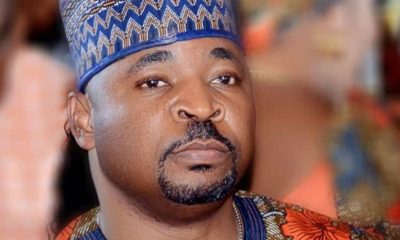
 metro2 days ago
metro2 days agoBring your children to compete with mine, MC Oluomo challenges those mocking his spoken English
-

 metro2 days ago
metro2 days agoI’m not in supremacy battle with Ooni, says new Alaafin
-

 News3 days ago
News3 days agoTinubu returns to Nigeria after France, UK trip
-

 Business2 days ago
Business2 days agoMarketers count losses as NNPC slashes petrol price
-

 metro2 days ago
metro2 days agoRivers: Fubara’s supporters praise Tinubu’s intervention with emergency rule
-

 metro2 days ago
metro2 days agoBandits attack Kwara North, kill vigilante, six others
-
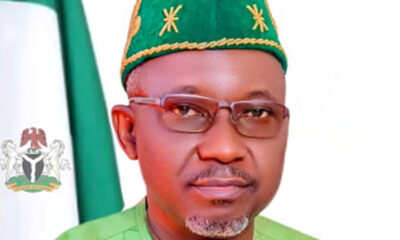
 Business1 day ago
Business1 day agoNigeria’s gas production increases by 15.6% to 227,931.65 mscf





